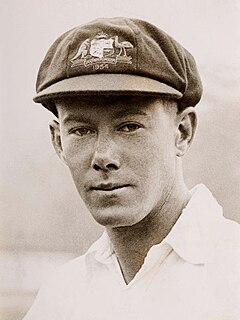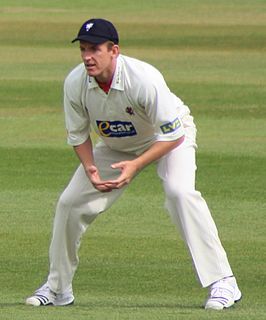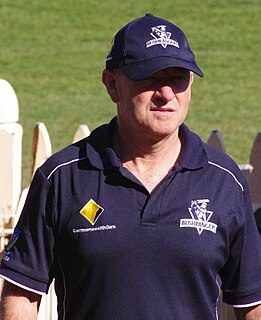Related Research Articles

David Clarence Boon is an Australian cricket match umpire, former cricket commentator and international cricketer whose international playing career spanned the years 1984–1996. A right-handed batsman and a very occasional off-spin bowler, he played first-class cricket for both his home state Tasmania and English county side Durham.

Edward James McKenzie Cowan is an Australian former cricketer, who has played for the British Universities, New South Wales (NSW), Tasmania, Oxford MCCU and Nottinghamshire teams. He is a left handed opening batsman. In March 2018, he announced his retirement from first-class cricket.

William Alfred Brown, was an Australian cricketer who played 22 Test matches between 1934 and 1948, captaining his country in one Test. A right-handed opening batsman, his partnership with Jack Fingleton in the 1930s is regarded as one of the finest in Australian Test history. After the interruption of World War II, Brown was a member of the team dubbed "The Invincibles", who toured England in 1948 without defeat under the leadership of Don Bradman. In a match in November 1947, Brown was the unwitting victim of the first instance of "Mankading".

James Redfern Hopes is an Australian cricket coach and former cricketer. Hopes played domestic cricket for Queensland, and had represented Australia in One Day International and Twenty20 cricket.
Michael James Di Venuto is an Australian cricket coach and former first-class cricketer who represented both Australia and Italy. The bulk of his first-class cricket career was spent playing for Tasmanian Tigers. After retiring from representative cricket in Australia, he continued playing for Durham County Cricket Club till July 2012, when he announced retirement from County Cricket. He has also previously played cricket in England for Derbyshire and Sussex. A left hand opening batsman, his form for Tasmania throughout the mid-1990s earned him a call up for the Australian national cricket team in the One Day International arena, although after nine games he was dropped. Like some of his contemporary Tasmanian teammates such as Jamie Cox, Dene Hills, and Shaun Young, Di Venuto can be considered unlucky to have not had a more successful international career, as he was playing at a time when the Australian national cricket team was highly dominant, and difficult to earn selection for. After retiring from Durham, he was appointed Australia's full-time batting coach by head coach Mickey Arthur, and was then head coach of Surrey from 2016 until 2020.

Callum James Ferguson is an Australian cricketer who has represented Australia in all three forms of international cricket. He currently represents South Australia in the JLT One-Day Cup. He was formally the captain of the Sydney Thunder in the Big Bash League before being released at the end of the 2020-2021 season

Damien Geoffrey Wright is a former Australian first-class cricketer, and former coach of the Hobart Hurricanes cricket team. Wright made his debut for Tasmania in 1997, playing with the team until switching to Victoria for the 2008–09 season. In 2002 he played in the Scottish cricket team as their one permitted overseas player—he also had previous spells in county cricket with Northamptonshire, Glamorgan and Somerset. He is a right-handed batsman and right-arm fast-medium bowler. He has a side-on bowling action and an ability to bounce the ball sharply. Wright started Coaching the Hobart Hurricanes in the Big Bash League 03 in 2013-14, he coached the team to defeat the Melbourne Stars, who were undefeated in the tournament until then. The Hurricanes then lost the final to the Perth Scorchers. Wright then coached the Hurricanes to the semi-finals in the Champions League T20 2014 in India.
Ian Charles Davis is a former Australian cricketer (batsman) who played in 15 Tests and 3 ODIs from 1973 to 1977. Ian retired from first-class cricket in 1984 then worked for Dunlop Slazenger until his retirement in 2010.
Roger Douglas Woolley is a former Australian cricketer who played in two Test matches and four One Day Internationals (ODIs) between 1983 and 1984. He was a middle-order batsman, and later a wicket-keeper. He was a member of the Tasmanian side that won their first domestic title in the 1978/79 Gillette Cup.
Jonathan Wayne Wells is an Australian cricket player, who plays for Western Australia in first-class and one-day cricket, and the Adelaide Strikers in the Big Bash League (BBL). He originates from Tasmania, and represented Tasmania in both first-class and one-day cricket prior.
Mark Neville Atkinson is a former Australian cricket player, who played for Tasmania. He played for the Tigers from 1990 until 2000, and was a regular feature in both their first class and one-day sides.

Gregory Shipperd is an Australian cricket coach and former cricketer who is the current coach of the Sydney Sixers coaching them to the Big Bash League title in BBL09 in 2019–20. He was also the coach of Delhi Daredevils. As a player, he represented Western Australia from 1977–78 to 1984–85 and finished his career with Tasmania in 1990–91. He went on to coach Tasmania and Victoria, as well as stints as coach of Twenty-20 cricket franchises Melbourne Stars and Delhi Daredevils.

Robert John Quiney is a former Australian cricketer. He played domestic first class and List A cricket for the Victorian Bushrangers side, and domestic Twenty20 cricket for the Melbourne Stars, Auckland Aces, Uthura Rudras and Rajasthan Royals. He was a tall (6'4') left-handed batsman who also bowled right-arm medium pace. He played his last game for the Melbourne Stars on 27 January 2018, after which he retired from professional cricket.
Raymond Harvey is an Australian former first-class cricketer who played for Victoria in the 1940s and 1950s. He was the brother of Australian Test batsmen Merv and Neil and first-class cricketer and umpire Mick Harvey. Ray Harvey was an attacking and talented batsman but failed to reach international standards and only managed to hold down a regular position in the Victorian team in two seasons in the 1950s. This failure to match the standards set by his Test-capped brothers was often attributed to a lack of single-mindedness and hunger.

James Archibald "Snowy" Atkinson was an Australian rules footballer and first class cricketer.

Hugh Joseph Plant was an Australian first-class cricketer who represented Victoria in the Sheffield Shield during the 1930s.
Ricky Ponting is a former Australian international cricketer who was born on 19 December 1974. He made his One Day International (ODI) debut for the Australian cricket team against the South Africa cricket team in New Zealand at the age of 20 on 15 February 1995. The eldest of three children, Ponting emulated the feats of his father, playing cricket in summer and Australian rules football in winter, before breaking his arm while playing the latter sport for a junior North Launceston Football Club team as a 14-year-old. He was educated in the Tasmanian state school system, studying at Mowbray Heights Primary and Brooks High School.
Marcus Sinclair Harris is an Australian cricketer who plays as an opening batsman for Victoria in domestic cricket. He made his Test cricket debut for the Australia national cricket team in December 2018.
Darrin Joseph Ramshaw is a former Australian cricketer who played at domestic level for Western Australia and Victoria during the late 1980s and early 1990s. The son of Graham Ramshaw, Ramshaw was a talented junior sportsman, playing Australian rules football for the Perth Football Club in the West Australian Football League (WAFL) and representing the Australian under-19 cricket team. He made his Sheffield Shield debut for Western Australia during the 1989–90 season, but moved to Victoria the following season, where he established himself as an opening batsman. Later moving to the middle order, in the absence of Dean Jones Ramshaw captained Victoria in several matches during the 1993–94 season, but that season was his last at state level. He later served as assistant coach of Tasmania and coach of Western Australia's under-19 team.
Jake Scott Lehmann is an Australian cricketer who plays for South Australia. He is the eldest son of former Australian coach Darren Lehmann. Well known for his moustache, Lehmann began his first-class career in the 2014–15 season and enjoyed early success, scoring a double century in his second season. He began playing for the Adelaide Strikers in the Big Bash League in 2015 and hit a match-winning six against the Hobart Hurricanes in the first ball of his career and the last ball of the innings.
References
- ↑ "The best XI never to wear a baggy green". The Age. Melbourne. 5 December 2004. Retrieved 28 January 2010.
- ↑ "Ex-England coach joins Australians". The Sydney Morning Herald. 2 December 2010. Retrieved 21 February 2020.